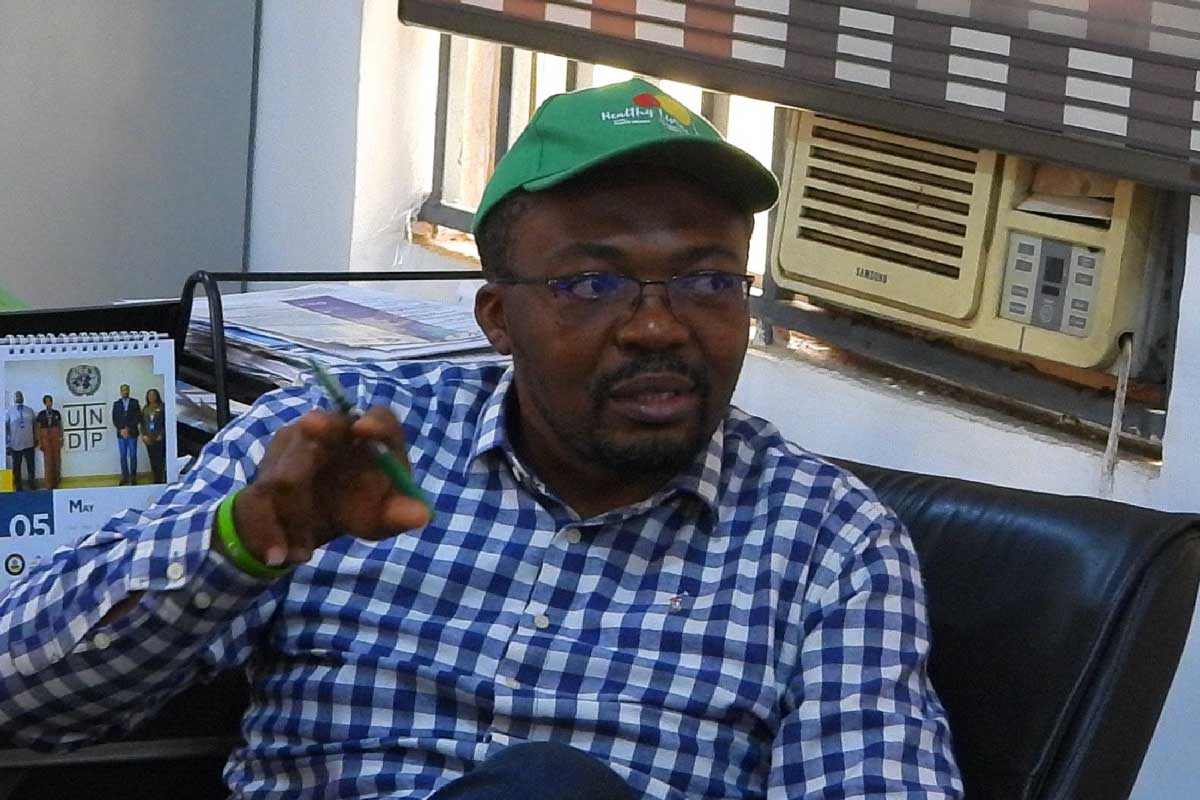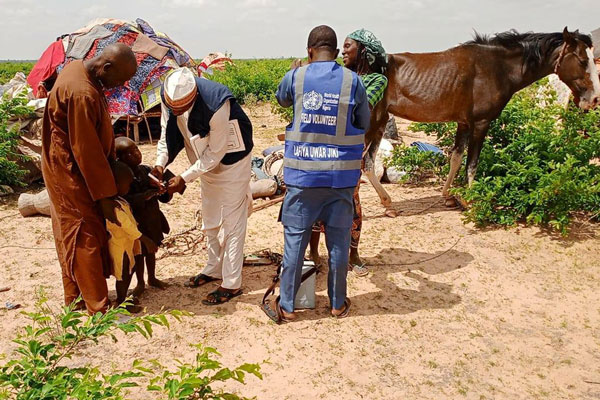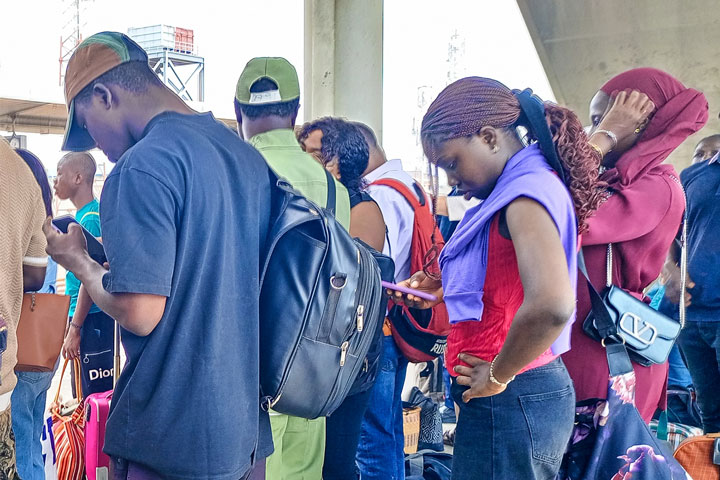The doctor will tweet you now
Troubled by Nigeria’s massive burden of preventable illness, a growing cohort of medics is taking to social media to offer advice and dispel health myths.
- 4 January 2024
- 13 min read
- by Jesusegun Alagbe
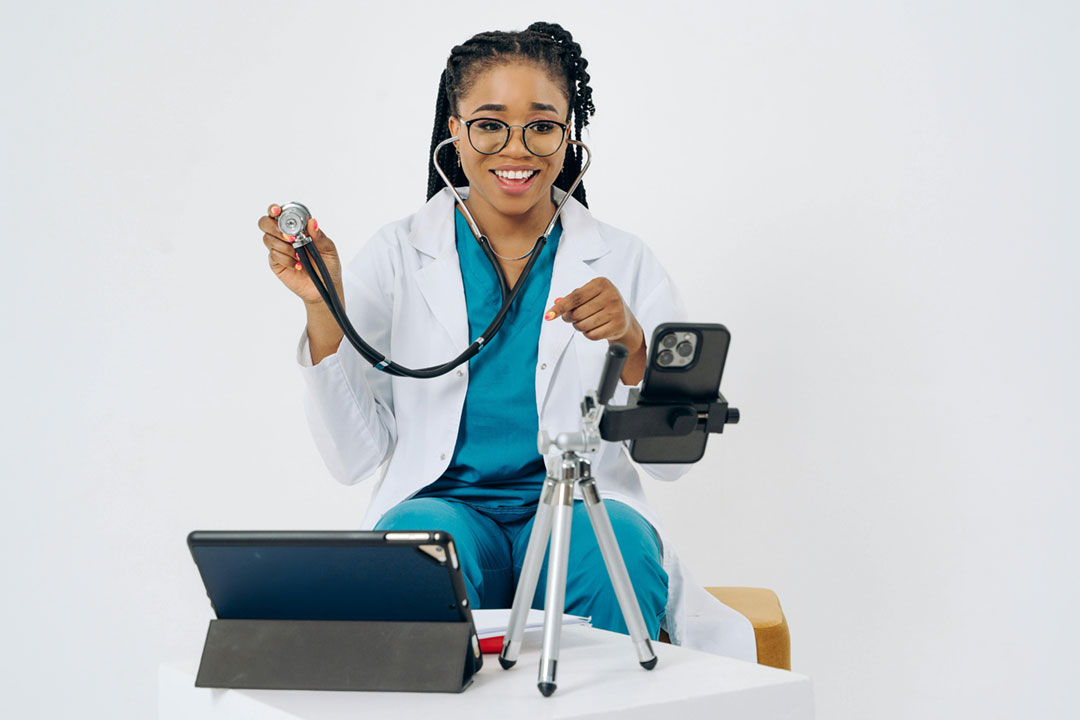
When it comes to health, Nigeria can boast some grim statistics. Take malaria: the mosquito-borne parasitic infection caused 68 million cases and 194,000 deaths in the country in 2021 alone – a figure that accounted for nearly 27% of the global malaria burden that year.
Another troubling figure: in 2021, the under-five mortality rate - the probability that a child will die before reaching 5 years of age - for Nigeria was 110.8 deaths per 1,000 live births, more than three times the global figure, which stood at 38 deaths per 1,000 births. Sixty-four percent of Nigeria's under-five deaths were caused by malaria, pneumonia or diarrhoea.
"Once in a while you will find someone who says I dance too much in my videos and that it’s not dignifying for a medical consultant. But at the end of the day, I think people learn more easily when information is presented in an absorbing way."
– Dr Ayodele Renner, paediatrician and Medical Consultant, Lagos Health Service Commission
Meanwhile, deaths of women due to pregnancy or childbirth-related complications (maternal mortality), has actually increased in recent years. In 2017, WHO put the figure at around 917 per 100,000 live births. By 2020, it stood at nearly 1,047 deaths, putting Nigeria among the three countries with the highest maternal mortality rates in the African region.
Moreover, an estimated 100 million Nigerians are at risk of at least one of the Neglected Tropical Diseases (NTDs), with several million people being infected with more than one of them, according to Uwem Friday Ekpo, a professor of Parasitology and Epidemiology at the Federal University of Agriculture, Abeokuta, Ogun State.
And against that background, Nigeria's health workforce is thinning critically. During the past five years alone, at least 5,000 doctors are reported to have left Nigeria for the United Kingdom, the United States, the Middle East and other African countries. In 2022, the Nigerian Association of Resident Doctors said a survey indicated six out of 10 doctors were planning to leave the country for greener pastures. Similarly, the nurses' union said 57,000 members left Nigeria for overseas between 2017 and 2022. Access to care, in other words, is becoming a trickier proposition for many Nigerians.
But, distraught at Nigeria's health crises, and charged up with the passion to change the narrative, a growing community of doctors in the country are taking to social media to share information and inspire a change.
Thanks to the high smartphone adoption rate, internet penetration and social media usage in Nigeria, whatever health tips the doctor-influencers share – on immunisation, sex and reproduction, cancer prevention and more – can reach millions of Nigerians. Judging by the volume of replies from online denizens, thanking the doctors and promising to schedule in-person check-ups, it's making a real-world difference already.
VaccinesWork got in touch with four of Nigeria's very online physicians to learn more.
1. Dr Gbemisola Boyede, neurodevelopmental paediatrician and founder of Ask The Paediatricians Foundation
Boyede is troubled by Nigeria's childhood morbidity rate - the rate of common illnesses among children - which is one of the highest in the world. At conferences, she felt antsy. It was not enough, she thought, to sit and talk about how dire the situation was.
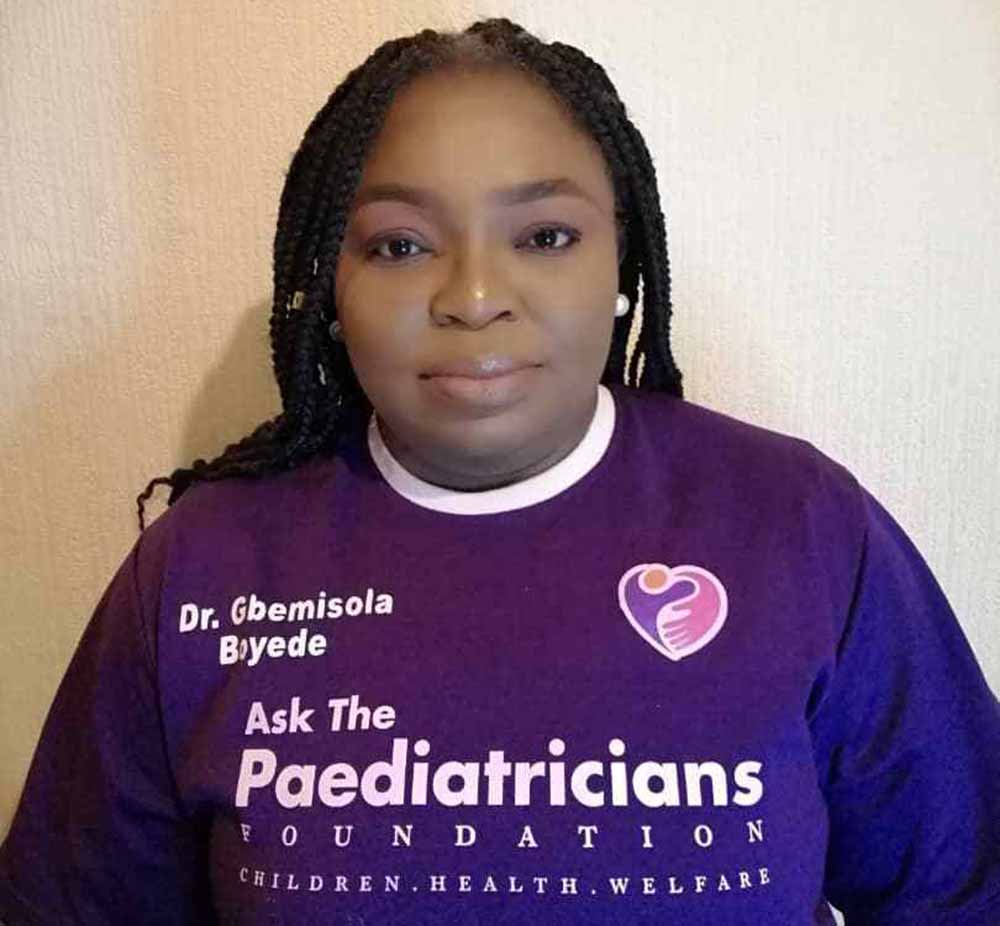
Credit: Dr Gbemisola Boyede
"We talked a lot as professionals and we had all the good ideas, but children were still dying," she told VaccinesWork. The reason, Boyede thought, was that parents, vital stakeholders in child health, were absent from those conversations.
To improve child health, Boyede knew parents needed to play a huge role, including by taking their children for immunisation. But she also knew that some mothers had false and dangerous ideas about child health.
On women's groups on Facebook, Boyede saw women crowdsourcing tips on their children's health. "Many times, the pieces of advice [online] were just terrible. I would cringe because the advice could kill the child. I would come in and offer medical advice, but then I noticed the mothers would rather take the response with the most likes in the group," she says.
"Many times, the pieces of advice [online] were just terrible. I would cringe because the advice could kill the child. I would come in and offer medical advice, but then I noticed the mothers would rather take the response with the most likes in the group."
– Dr Gbemisola Boyede, neurodevelopmental paediatrician and founder of Ask The Paediatricians Foundation
So in July 2015, Boyede created a Facebook group with a difference. She called it Ask the Paediatricians. "When it comes to child health, a mother should not be asking her fellow mothers for advice, as some of them are as ignorant as she is," she says.
Today, Ask the Paediatricians has grown to more than 718,000 members, with testimonies pouring in from mothers across Nigeria on how much the qualified medical advice offered on the site has helped them.
"Some mothers would tell me they did exclusive breastfeeding for their babies because of my advice," Boyede says. "In addition to answering mothers' questions, I organise seminars and webinars on various topics like immunisation and breastfeeding. The videos are available on the Facebook group, our website and YouTube platform. Currently, I'm doing a series on immunisation, talking about each vaccine in the routine immunisation schedule and why it is important for mothers to give their babies. I did a talk recently on the importance of the HPV [human papillomavirus] vaccine, which was [recently] launched for girls aged 9 to 14 to fight cervical cancer."
Being on social media answering mothers' questions takes time and energy. But Boyede says the appreciation she gets from mothers both online and offline encourages her.
"One of the things that makes the Ask the Paediatricians group unique is that we don't allow other people to give answers to health issues. Today, the group has earned respect to the extent that I hear people online and offline tell mothers that if they want answers to their children's health issues, they should go to Ask the Paediatricians. When I read such comments on Facebook, Instagram, or others, I feel happy, because this is exactly what I set out to achieve right from the beginning. Overall, I feel satisfied for every child that we are able to save," she says.
Boyede recalls one memorable case. Some years ago, a worried mother posted a picture of her emaciated child in the group. The boy appeared to be on the verge of death.
"I was still working at LUTH [Lagos University Teaching Hospital]. You would think this child was from a wartorn country because of his very skinny looks. The child was almost a year old but was still weighing 4kg. For context, an average newborn baby weighs 3kg. The child's mother asked on the platform how her child could be helped. I knew the baby was going to die if he wasn't attended to immediately, so I private-chatted to the mother and asked her to bring her baby to me at the hospital.
"Someone paid for the baby's treatment and he was treated. About two months later when I saw the baby, he weighed around 8kg. Such testimonies keep me going whenever I get tired of running ATP because of the stress involved," she says.
But access to ATP is still conditional on access to the internet – and in Nigeria, there are millions of women with no smartphone, particularly in rural areas. To try and make her platform more inclusive of those women, Boyede founded a nonprofit called Ask the Paediatricians Foundation.
"Through the nonprofit, we do community outreaches across Nigeria, and the interesting thing is that most of the volunteers for the outreaches are those from the online group who had benefited from our work and are giving back to society. I have never met many of them, but each time we organise outreaches, they are always there. There are plenty of testimonies from such outreaches and that is why we will continue to do more," she says.
Have you read?
Edidiong Okon, one Nigerian mum who has benefited from Boyede's work, told VaccinesWork there were many things concerning her children's health that she would never have known if not for the Ask the Paediatricians Facebook group.
"I came across the group in 2019 when I was pregnant with my first child, and all the various health tips Dr Boyede offered helped me to become more aware of my child's health. There are many wrong practices African mothers passed to their daughters about caring for children, but through the ATP group, I knew the right thing to do," she says.
2. Dr Ayodele Renner, paediatrician and Medical Consultant, Lagos Health Service Commission
Known as The Noisy Naija Paediatrician on social media, Renner has been a health influencer since 2017. His motivation, he says, is his love for children.
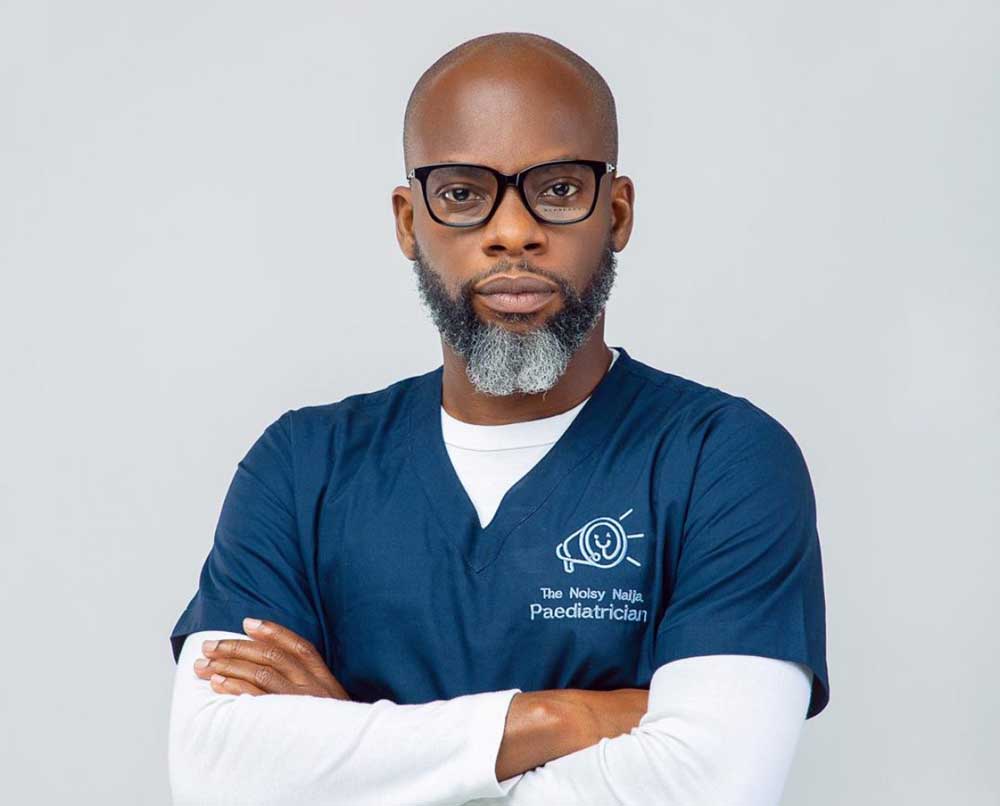
Credit: Dr Ayodele Renner
"I post more content on Instagram but I'm exploring X as well. My content comes mostly from questions that mothers ask me. I use humour in my videos because Nigerians love humour. They know how to make fun of a serious situation. The attention span of social media users is small, so I have to keep my videos as short as possible while ensuring that the health information is not lost," he told VaccinesWork.
Renner gives regular tips on topics such as immunisation, "because questions related to the topic come up frequently in my encounters with mothers," he says.
In many ways, his influencer work has also helped his medical practice.
"The reception of my content has been overwhelmingly positive, though once in a while you will find someone who says I dance too much in my videos and that it's not dignifying for a medical consultant. But at the end of the day, I think people learn more easily when information is presented in an absorbing way.
"Sometimes I think, how many people or patients can I attend to in my entire career? Yet the internet and social media have empowered me to reach millions of people."
– Dr Ayodele Renner, paediatrician and Medical Consultant, Lagos Health Service Commission
"What my influencing work has done for me is that it has helped me to listen to the questions that mothers have, which helps me to do more research and determine what the best practices are regarding the questions. So if a mother asks me about heat rashes, I will refresh my memory and look for the latest medical treatments. So if another mother asks the same question next time, I am better equipped to give the best answer. Overall, this has improved my medical work," Renner says.
"The reward is the satisfaction I get from helping people," he adds, "because health influencing is more like public service."
"Some months, I reach a million people on Instagram alone and sometimes I think, how many people or patients can I attend to in my entire career? Yet the internet and social media have empowered me to reach millions of people. Sometimes when I'm walking on the road or in the store buying groceries, someone walks to me and thanks me for my work. That, to me, is the greatest reward. Also, I have been invited to some gatherings which ordinarily I would never have been invited to if I didn't do content creation," Renner says.
3. Dr Chioma Nwakanma-Akanno, sexual and reproductive health expert
Nicknamed Dr Zobo, because of her love for zobo drink, a vibrant Nigerian beverage made from dried hibiscus petals and a mix of spices, Nwakanma-Akanno offers free medical tips on sexual and reproductive health to her tens of thousands of followers on social media.
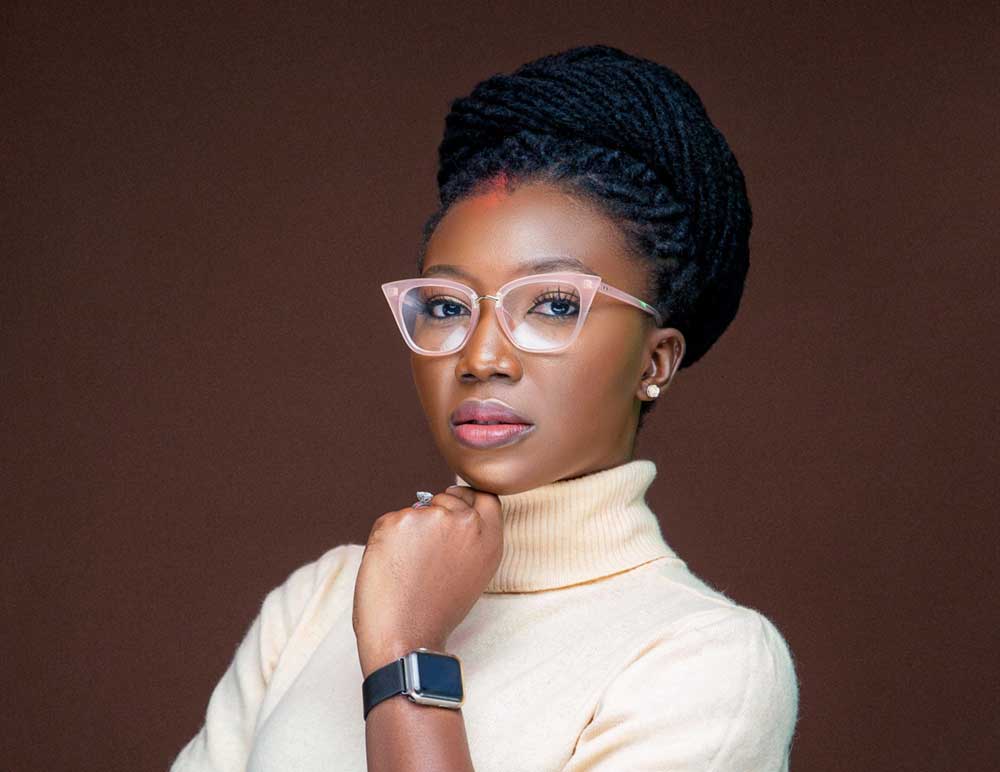
Credit: Dr Nwakanma-Akanno
Nwakanma-Akanno said she decided to get active on the internet during her early years of medical practice. Every day, patients were showing up at the hospital with preventable diseases that they could have avoided had they been armed with just a little bit of information.
"One of the reasons behind the high mortality rate that we see from preventable diseases is ignorance. So I decided it was time for me to help in closing the health illiteracy gap, especially when it comes to preventable diseases."
– Dr Chioma Nwakanma-Akanno, sexual and reproductive health expert
"They would tell me they wished they knew better. That trend exposed one of the reasons behind the high mortality rate that we see from preventable diseases, which is ignorance. So I decided it was time for me to help in closing the health illiteracy gap, especially when it comes to preventable diseases," she said.
In time, she established a nonprofit, Smile With Me, through which she runs online and physical health education campaigns on cervical cancer prevention, one of the most common and deadliest forms of cancer among women in Nigeria.
"For instance, every January, it is cervical cancer prevention awareness month. On social media, I have been able to make over 20 million impressions over the years. Through Smile With Me, we also do community outreaches and we have toured six states and reached out to over 25,000 people and done cancer screening for over 2,000 women.
"We are happy that the HPV vaccine is now free for young girls. It will definitely help reduce the scourge of cervical cancer among Nigerian women. The HPV vaccine is still riddled with disinformation and misinformation, but we have to keep advocating [for it] and educating women," Nwakanma-Akanno said.
She said every week her posts get five to seven million impressions across all her social media platforms.
"I do what I do because when people are more informed about their health, they are more likely to make healthier choices," she said. "There is monetary reward and speaking and research opportunities that come with pursuing my passion."
4. Dr Olusina Ajidahun, internal medicine specialist
Known online as The Bearded Dr Sina, Ajidahun posts on various health topics to more than 150,000 social media followers.
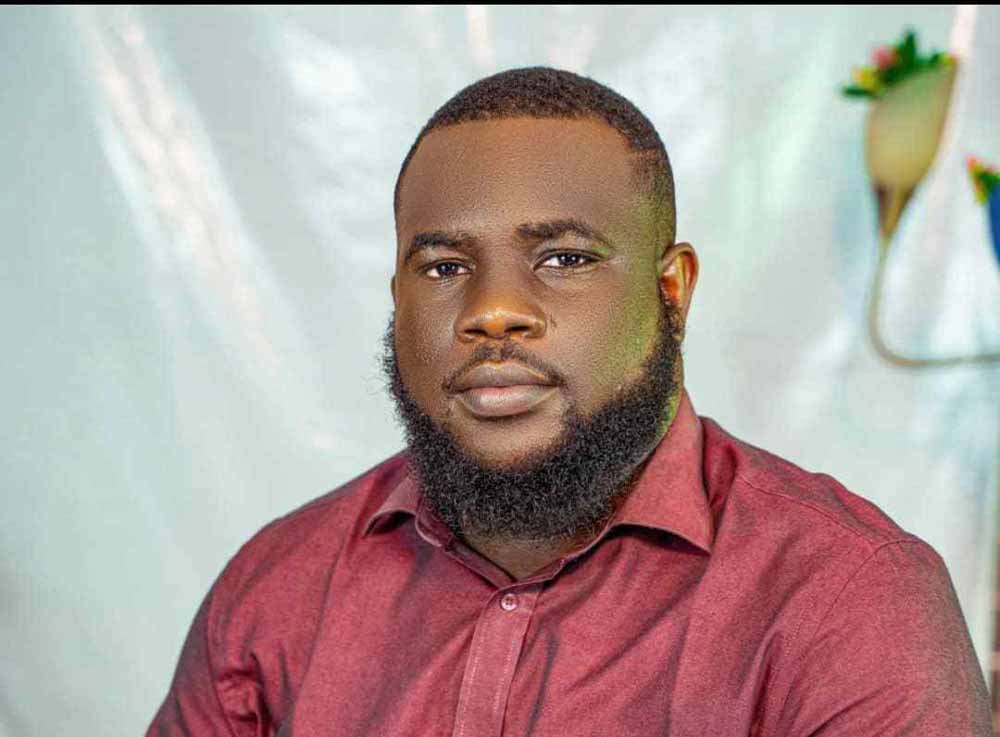
Credit: Dr Olusina Ajidahun
"I started posting health information on social media when I was still studying at the University of Ibadan, and I got some awards as a social media personality. I discovered that I have the flair to always explain medical terminologies to people in simple language and I would get commendations from them saying I was good at it. I started on Instagram and then Twitter.
"By 2019, as a practising doctor, I noticed there was a big gap in health knowledge in Nigeria. I also knew an average Nigerian youth spends a good time on social media, so I thought if I could start creating interesting health content, I would be able to reach many people and help bridge the knowledge gap," he told VaccinesWork.
"I discovered that I have the flair to always explain medical terminologies to people in simple language and I would get commendations from them saying I was good at it."
– Dr Olusina Ajidahun, internal medicine specialist
But there was a big challenge when he started out: opposition from his colleagues.
"When I started, the first opposition I got came from doctor colleagues who asked why I was sharing medical tips on social media. Some told me I was chasing clout. Some said I should be referring people to the hospital rather than sharing tips. I lost some friends, even former classmates, in the process. I cut the friendships because of the negative energy I was getting from them. I think that was the only challenge I have faced so far," he said.
His approach to content creation is demand-led. He does research and observes what medical issues people are talking about but do not understand at the moment. "During the COVID pandemic, I produced content encouraging people to take the vaccine. I also have a Telegram channel with thousands of subscribers and I give out free health information daily. Today, I collaborate with some brands and every month, I'm invited to Twitter Spaces to talk about health. More recently when the HPV vaccine was rolled out for girls, I did some content on why it was important for Nigerian girls," he said.
Between running his medical practice, content creation and running a health technology startup, Ajidahun is a busy man. What keeps him going, he says, is the impact his job has on the people.
"This is a time when many doctors are leaving Nigeria and some people would ask what I am still doing in Nigeria. It gives me happiness that some of us who are still here are making a change in people's lives through our work," he said.

